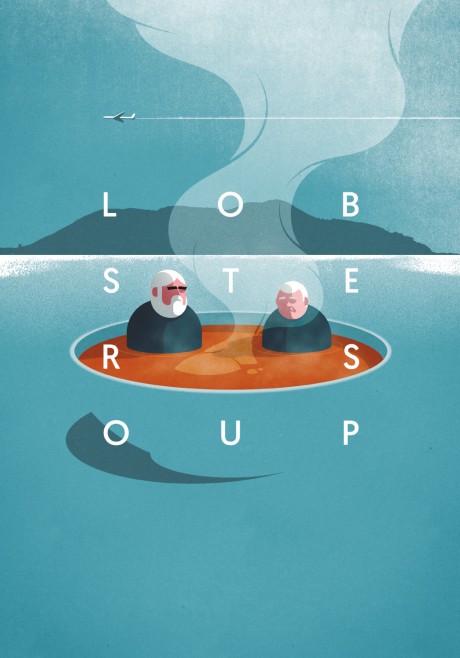


Pepe Andreu and Rafael Molés: Lobster Soup

“Every morning Krilli prepares the many ingredients of Bryggjan’s lobster soup, a tiny cafe in a small town in Iceland. Alli, Krilli’s brother, sits with the old fishermen, the last boxer of Iceland and a writer, who find, every day, a new solution for all the problems of the world.
People from abroad come to Iceland to see the volcanoes, the ice and the genesis of the Earth. And now the tourists and the lava field seem to push the whole town more and more towards the sea. The Bryggjan cafe holds the port, clinging to the ground. It serves as a shelter on the last 3,000 square meters of buildable ground in the harbour for the locals of the town.”
The text is taken from the website of the the production company of the two
directors Pepe Andreu and Rafa Molés. It’s the “little story” and the “big story” from Grindavik, that lies only 5 km from the famous Blue Lagoon. I have been there but had I known about Grindavik’s lovely café Bryggjan, I had for sure paid a visit to enjoy and observe and talk with the aged customers. They would understand Danish and speak it I am sure.
A visit, at least because of the way that the two Spanish directors saw it and conveyed it warmly into a fine documentary about a place, where people meet in an atmosphere of caring and sharing. Caring about each other and sharing the latest local and global news – having cultural events like readings of literature, jazz music, football matches on tv. With pictures on the wall from before and the delicious lobster soup. No surprise that also tourists feel at home here. No surprise that they also come in groups to be served in the café and visit the local fishing factory.
Faces of those who come to the café. Marked by time. By Life. By work. A fishermen’s place. Wonderful to see how the camera catches them and the stories that come up. As an example there is a marvellous scene in Bryggjan with Alli (Adalgeir) and the former champion boxer. Bravo filmmakers to stay with them long, while they are singing songs, telling stories, looking at each other, feeling good in each other’s company. Outside the sun is shining or it looks cold with snow. And on the first floor of the Bryggjan building they produce huge fishing nets. Grindavik has 2500 inhabitants, the fishing industry does not go that well any longer, there is a growing interest to have more tourism and there are investors from Reykjavik, who come to visit. At the same time as Alli’s brother Krilli (Kristinn) and his wife would like to move to the capital… won’t be a spoiler, see for yourself.
There is – in this lovely example of slow cinema – a tone of melancholy that is very much personalised in Adalgeir, big beard and big belly, as we see him in Bryggjan and at home; the times they are a changing, we have to face that, and we are not getting younger…
Did I forget to mention that the film is so well made, images and sound and editing?